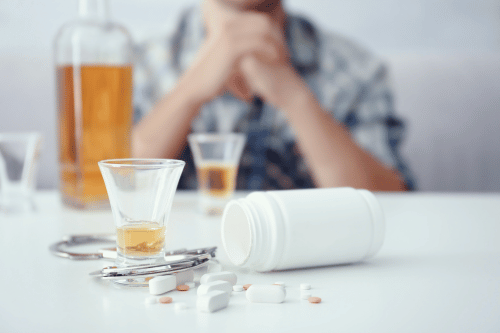Klonopin and Alcohol: A Dangerous Combination
Klonopin (clonazepam) is a prescription medication that falls under the benzodiazepine class. It is commonly prescribed to treat conditions like anxiety disorders, panic attacks, and seizures. While this drug can be highly effective when taken under medical supervision, its potential for misuse grows significantly when combined with alcohol. The interaction between Klonopin and alcohol can have dire consequences, as both substances affect the central nervous system. Understanding the risks and dangers of combining these two substances, often referred to as ‘alcohol klonopin’, is critical for anyone using Klonopin or alcohol, particularly those who may be at risk of developing a substance use disorder.
What is Klonopin?
Klonopin is a benzodiazepine, a class of drugs that works as a central nervous system depressant (CNS) to provide a calming effect on the brain. It is commonly prescribed to manage anxiety disorders, panic disorders, and treat seizures. Klonopin works by enhancing the activity of gamma-aminobutyric acid (GABA), a neurotransmitter in the brain that helps regulate nervous system activity. By increasing GABA levels, Klonopin helps reduce excessive brain activity that can lead to anxiety, seizures, and panic attacks.
However, Klonopin also has sedative effects, which is why it is often misused. Individuals prescribed Klonopin must adhere to medical guidance, as taking it in higher doses than prescribed or combining it with other substances, such as alcohol, to amplify its effects is highly dangerous and can lead to severe health risks.

The Risks of Mixing Klonopin and Alcohol
Both Klonopin and alcohol are CNS depressants. When taken together, the sedative effects of both substances intensify, leading to a higher risk of respiratory depression, blackouts, memory problems, and overdose. Mixing Klonopin and alcohol can also result in extreme drowsiness, confusion, impaired motor skills, and slowed reaction times, making everyday activities like driving extremely dangerous. Additionally, individuals with alcohol addiction may find it particularly challenging to manage their dependencies without professional help and individualized care.
Respiratory Depression: One of the most severe risks of mixing Klonopin and alcohol is respiratory depression. Both substances suppress breathing, and when combined, they can cause the body to slow its breathing to dangerous levels. In some cases, individuals may stop breathing altogether, which can be fatal without immediate medical intervention.
Increased Risk of Overdose: Combining these two substances significantly increases the risk of an overdose. Both Klonopin and alcohol slow down the central nervous system, leading to a cumulative effect. Individuals may become overly sedated, unconscious, or experience respiratory failure. In extreme cases, overdose can be fatal. Medical supervision is crucial during detox to manage severe alcohol withdrawal symptoms and prevent life-threatening complications.
Memory Problems and Blackouts: The combination of Klonopin and alcohol can impair cognitive function, leading to short-term memory loss and blackouts. These memory lapses increase the risk of accidents, poor decision-making, and engaging in risky behaviors.
Physical and Mental Health Risks: Over time, mixing Klonopin and alcohol can lead to severe physical and mental health issues. Chronic alcohol use damages the liver, which plays a crucial role in metabolizing drugs like Klonopin. As the liver becomes less efficient at processing these substances, individuals are at greater risk of drug toxicity, liver failure, and long-term cognitive impairment.

Short-Term Effects of Mixing Klonopin and Alcohol
The short-term effects of drinking alcohol while taking Klonopin include extreme drowsiness, dizziness, confusion, and impaired judgment. Many people underestimate how quickly the sedative effects can take hold, leading to accidental overdoses. The combination of these substances can cause the following short-term effects:
Slowed breathing: This can lead to respiratory distress or failure, which can be life-threatening.
Severe drowsiness: The enhanced sedative effects can cause individuals to pass out or lose consciousness.
Coordination and motor skill impairment: This increases the likelihood of accidents, falls, or other injuries.
Slurred speech and confusion: These cognitive impairments can prevent individuals from recognizing the severity of their situation or seeking help.
Long-Term Health Risks
The long-term health risks of combining Klonopin and alcohol include both physical and psychological effects. Over time, repeated misuse of these substances can lead to significant health issues. Alcohol abuse not only causes physiological damage but also has broader social implications, necessitating awareness and preventive strategies.
Dependency and Addiction: Both alcohol and Klonopin are highly addictive substances. When taken together, the risk of developing a dependency on one or both substances increases. Many individuals start by misusing one substance and then gradually introduce the other, leading to a complex pattern of polysubstance abuse. Substance abuse, including the misuse of alcohol and Klonopin, requires timely intervention and medical oversight to prevent long-term addiction and health complications.
Liver Damage: Chronic alcohol use can cause liver damage and impair the body’s ability to metabolize drugs like Klonopin. This can lead to increased levels of the drug in the bloodstream, further amplifying the sedative effects and increasing the risk of overdose.
Cognitive Impairment: Long-term use of both Klonopin and alcohol can result in permanent cognitive impairment, including memory problems, difficulty concentrating, and slower reaction times.
Why Do People Mix Klonopin and Alcohol?
Despite the well-known risks, many people mix Klonopin and consume alcohol to enhance the relaxing effects of both substances. Klonopin’s ability to calm anxiety, combined with alcohol’s sedative properties, can create a feeling of extreme relaxation or euphoria. However, this feeling comes with significant risks. Some individuals may not be aware of the dangers or may underestimate how dangerous the combination is. In other cases, individuals may be using both substances to self-medicate for mental health issues like anxiety, depression, or insomnia.
Addiction and Substance Use Disorders
Mixing alcohol and Klonopin greatly increases the likelihood of developing a substance use disorder. Addiction to benzodiazepines like Klonopin is a serious condition that requires professional treatment. Many individuals who become addicted to Klonopin or alcohol develop a tolerance over time, requiring larger doses to achieve the same effects. This increases the risk of overdose and long-term health complications. Early intervention is crucial in addressing klonopin addiction to prevent worsening substance abuse and ensure effective treatment.
In many cases, individuals who misuse both Klonopin and alcohol require a formal treatment program to help them overcome their addiction. Withdrawal from both substances can be dangerous and may require medically monitored detox to ensure a safe and effective recovery. Addressing drug abuse issues, such as alcohol and benzodiazepine dependencies, is essential to prevent severe consequences like overdose and to find appropriate treatment solutions.

Addiction Treatment for Klonopin and Alcohol Misuse
If you or someone you know is struggling with Klonopin and alcohol misuse, it’s essential to seek professional addiction treatment as soon as possible. Klonopin and alcohol addiction often requires specialized treatment facilities for detoxification and rehabilitation. There are several treatment options available, including:
Inpatient Treatment
This type of program provides 24/7 medical supervision in a controlled environment. Inpatient treatment is recommended for individuals with severe addiction or those at risk of dangerous withdrawal symptoms.
Outpatient Treatment
Outpatient programs allow individuals to receive treatment while continuing to live at home. This option is ideal for those with less severe substance use disorders or individuals who have completed inpatient treatment and are transitioning to a lower level of care.
Group Therapy and Support Groups
Group therapy provides a supportive environment where individuals can connect with others who are experiencing similar challenges. Support groups like Alcoholics Anonymous (AA) or Narcotics Anonymous (NA) offer a community of individuals in recovery who can provide guidance and encouragement.
Medication-Assisted Treatment (MAT)
In some cases, individuals may benefit from medication-assisted treatment to help manage withdrawal symptoms and reduce cravings. MAT programs use medications like buprenorphine or naltrexone to help individuals maintain sobriety and avoid relapse.
Conclusion
Mixing Klonopin and alcohol is a dangerous combination that can have severe health consequences, including respiratory depression, overdose, and long-term physical and mental health issues. If you or someone you know is struggling with addiction to Klonopin, alcohol, or both, it’s critical to seek professional help.
Treatment options such as inpatient or outpatient care, therapy, and medication-assisted treatment can provide the tools and support needed for long-term recovery. Don’t wait to get help—reach out to a treatment center today to start your journey toward a healthier, addiction-free life.










